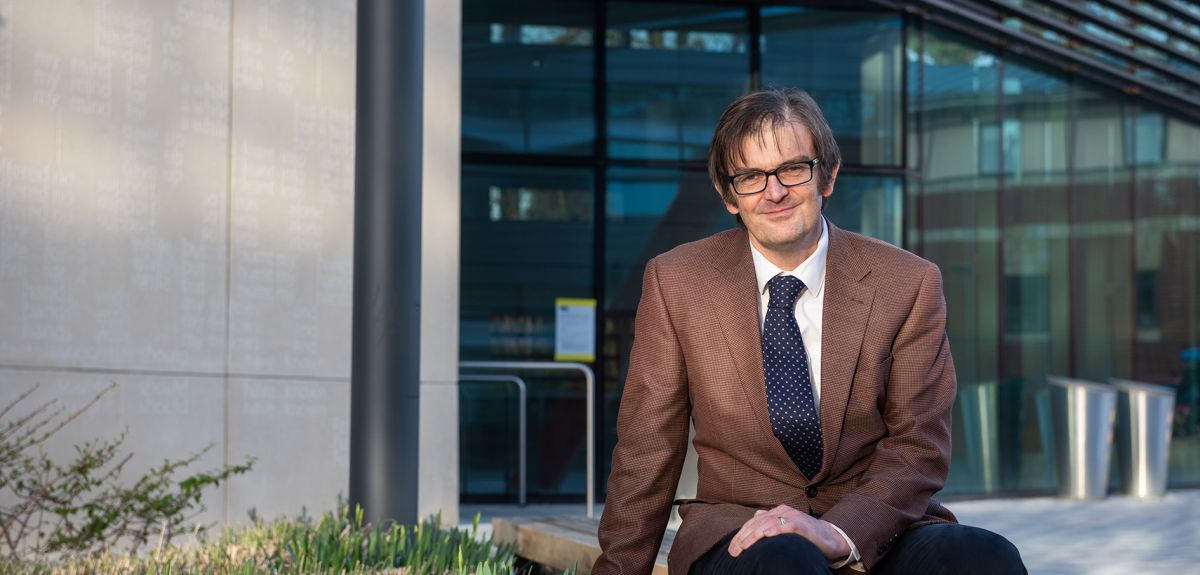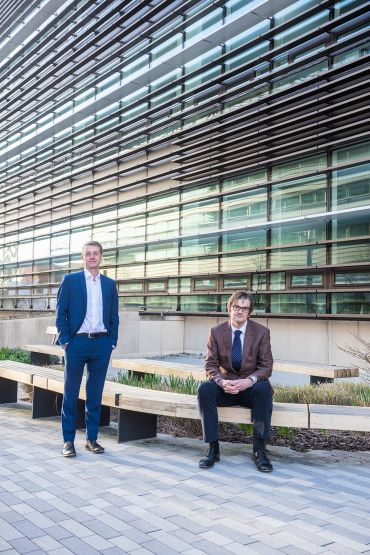
A million reasons for talking to Professor Martin Landray.
Imagine saving a million lives. While the world was in the first throes of the pandemic and paralysed in the face of the seemingly unstoppable spread of the coronavirus, two Oxford professors, Peter Horby and Martin Landray, started a trial which is estimated to have saved around one million lives with a £5 medicine that is available across the world.
 In an interview for Science blog, Professor Landray explains that he mooted the idea on 28 Feburary 2020, in an email to Sir Jeremy Farrar, the head of Wellcome. A few days later, they discussed it on a No 18 bus to Marylebone. Sir Jeremy suggested he join forces with Professor Horby, an expert in infectious diseases and epidemiology and a nodding acquaintance from Oxford’s medical science community. And the rest really is history.
In an interview for Science blog, Professor Landray explains that he mooted the idea on 28 Feburary 2020, in an email to Sir Jeremy Farrar, the head of Wellcome. A few days later, they discussed it on a No 18 bus to Marylebone. Sir Jeremy suggested he join forces with Professor Horby, an expert in infectious diseases and epidemiology and a nodding acquaintance from Oxford’s medical science community. And the rest really is history.
Treatments for COVID-19 were urgently needed in early 2020, since there were no known treatments when the virus took hold. Oxford colleagues had quickly begun working on a vaccine, but Professor Landray, an expert in heart conditions and drugs trials, suggested that a trial be conducted with hospitalised patients to see if any existing medicines could be used in the fight against the worst effects of the virus. Speed was of the essence; treatments were needed rapidly whilst vaccines were being developed and rolled out – and they are still a crucial piece of the jigsaw needed to complement preventative measures and save lives.
Within days, with backing from Oxford colleagues, they had set up and gained approval for the ground-breaking RECOVERY trial. By 19 March, they had recruited their first participant. Three months later, they had found the first proven effective treatment.
Simplicity was the key, according to Professor Landray, ‘Patients were very sick and we couldn’t burden the NHS with demands on their time....a streamlined clinical trial which was integrated with clinical care was the only way.’
Within days...the pair had set up and gained approval for the ground-breaking RECOVERY trial. By 19 March, they had recruited their first participant. Three months later, they had found the first proven effective treatment.
So, clinicians were asked to enter basic patient details on the trial website and, initially, the system randomly allocated one of four carefully-chosen drugs, each offering the potential to tackle the disease, or no additional treatment alongside oxygen and ventilator treatments. It was a classic randomised controlled trial – including a control sample who received no additional treatment beyond the usual care in their hospital – but one which had not been used in such circumstances before.
The medical profession in the UK responded with alacrity and enthusiasm, eager to help beat the virus. More than 4,000 medical professionals in every acute NHS hospital in the country took part and nearly 40,000 patients have now been enlisted.

‘Many clinicians grabbed the opportunity to help find solutions to this crisis,’ says Professor Landray. ‘And we couldn’t have done it without their support.’
A triumph for collaboration and research, by mid-June, dexamethasone, a commonly-available steroid, was found to be effective in patients on ventilators and those receiving oxygen. ‘It had very clear benefits,’ says Professor Landray, remembering the excitement around the finding. ‘We’d never seen anything like it.’
Many clinicians grabbed the opportunity to help find solutions to this crisis...and we couldn’t have done it without their support
Professor Martin Landray
It was not a cure, but it prevented 30% of deaths and it quickly became standard care around the world – reversing previous thinking which had suggested that it shouldn’t be used because it was ineffective or might even be harmful. In early June, another drug, hydroxychloroquine, which had been hailed as a miracle cure, was found by the trial to be useless for hospitalised patients.
They announced the dexamethasone news at 1pm on 16 June 2020, says Professor Landray. He was still talking to the media at 11pm. Professor Horby travelled to No10 to present the news alongside the Prime Minister at a Government briefing.
‘He was wearing my tie as didn’t have one with him,’ laughs Professor Landray, who takes no chances. ‘I had brought in two.’
A triumph for collaboration and research, by mid-June, dexamethasone, a commonly-available steroid, was found to be effective in patients on ventilators and those receiving oxygen
As the Deputy Director of Oxford University’s Big Data Institute, Professor Landray knows about large numbers. He is delighted by the success of the trial, especially the key role played by doctors, nurses, and patients in hospitals from the Western Isles to Truro, but he says, ‘What matters is that in 100 days, with all the people involved in the trial, a treatment was found.’
It has been a stunning success, and the professors were last week honoured to be elected as fellows of the Academy of Medical Sciences, alongside a host of Oxford colleagues, for their exceptional contributions to the advancement of medical science, an accolade that recognises the impact of RECOVERY and the importance of their previous work.
The building which houses Oxford’s Big Data Institute and part of the Nuffield Department of Population Health exemplifies Professor Landray’s streamlined approach, which is not surprising, since he was involved in the design - very modern, with clean, geometric lines, light wood panels and open offices. In usual times, it is alive with 500 data scientists, ethicists, philosophers, and population health experts, all under one beautiful roof.
Professor Landray credits the strength of the medical community at Oxford for much of his success. ‘We are very fortunate in Oxford. There is huge strength and depth. There are the people at Oxford who have written landmark papers, the headline people from conferences. I am very lucky to have had people to help, support and mentor me.’ He adds, ‘Richard Doll (the man credited with proving that smoking causes lung cancer) was here when I first moved to Oxford.’
There are the people at Oxford who have written landmark papers, the headline people from conferences. I am very lucky to have had people to help, support and mentor me
Professor Landray credits the strength of the medical community at Oxford
Professor Landray is an Oxfordshire local, who grew up and still lives in a village some half an hour’s drive from the city. He literally married the girl next door – although to be precise, of course, he says, ‘She lived about 50 yards away.’
Professor Landray knew early on that he wanted to be a doctor. ‘Medicine was all around us, my mother was a part-time anaesthetist, my father was the local GP – very much in the James Herriot style.’
Some of his earliest memories are of patients coming to the house and lying on the family sofa, so his father could examine them.
‘I never thought about doing anything else,’ says Professor Landray. Life as a local GP was not to be, though, since after medical school at Birmingham University, the young doctor never did take over from his father, becoming instead a clinical pharmacologist and heart specialist.
In fact, until the pandemic, he had not taken much of an interest in infections since 1980, when the young Martin wrote an article about germs for the local children’s newspaper. Clearly amused, he says, ‘It’s in the Bodleian, complete with a picture of a germ I drew myself. I didn’t publish another paper on infections until 2020.'
 Professor Peter Horby (tieless) and Professor Martin Landray were last week honoured to be elected as fellows of the Academy of Medical Sciences.
Photo by John Cairns.
Professor Peter Horby (tieless) and Professor Martin Landray were last week honoured to be elected as fellows of the Academy of Medical Sciences.
Photo by John Cairns.He joined the group led by Professor Sir Rory Collins and Professor Sir Richard Peto, whose work on clinical trials for heart attack he had admired as a student.
‘I remember reading the results of their trial of aspirin and clot buster drugs for patients suffering a heart attack,’ he says of the Second International Study of Infarct Survival (known as ISIS-2). ‘It changed the treatment of heart attacks overnight.
‘It was so simple, so elegant, and so powerful.’
It made a massive impression on the young medic. Professor Landray’s enthusiasm is palpable as he talks about the potential for other trials in other diseases, building on the success of the RECOVERY trial.
RECOVERY has shown that, by combining scientific rigour with large numbers of participants and streamlined processes that make it easy for clinicians and patients to participate, it is possible to find which drugs work best rapidly, even in the context of a pandemic. According to Professor Landray, the potential of these kind of trials could be enormous for the fight against disease, but it runs counter to the ways trials are currently conducted.
‘Trials often cost $1 billion,’ he explains. ‘It’s a massive investment....even for big pharma, it’s a big cost. [Unlike RECOVERY] many trials are too small, too short, and too complex.’
Trials often cost $1 billion. It’s a massive investment....even for big pharma, it’s a big cost.. many trials are too small, too short, and too complex...RECOVERY has changed all that....So many areas need better treatments, we need to work out what works...It has to be the future
Professor Landray
And, because of that, a lot of areas of medicine rely on the opinions of doctors, who sometimes prescribe treatments based on ‘educated guess work’, rather than the hard data provided by a RECOVERY-style trial.
Assessing treatments as part of a randomised controlled trial enabled the team to see which yielded positive results – and which did not. In some situations, doctors do not have access to such information. Professor Landray says, ‘There is a real risk in throwing drugs at people if we don’t know if they’re going to work.’
He hopes, ‘RECOVERY has changed all that....So many areas need better treatments, we need to work out what works...It has to be the future. It’s possible to do much better on a much larger scale,’ he says. ‘You need scale for the data.’
Research may occupy him, but Professor Landray is every inch the sort of reassuring doctor you would want to see if unwell. Treating patients is important to the professor, who spends a morning in clinic each week, seeing members of the public.
‘Everything starts and finishes with patients,’ he says.
For more of the story, listen to: Inside Health, Recovery Trial, BBC Radio 4.